

Open edX: Why we’re relicensing XBlock API under Apache. Why Open Source Misses the Point of Free Software. When we call software “free,” we mean that it respects the users' essential freedoms: the freedom to run it, to study and change it, and to redistribute copies with or without changes.
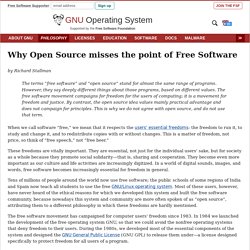
This is a matter of freedom, not price, so think of “free speech,” not “free beer.” These freedoms are vitally important. They are essential, not just for the individual users' sake, but for society as a whole because they promote social solidarity—that is, sharing and cooperation. They become even more important as our culture and life activities are increasingly digitized. In a world of digital sounds, images, and words, free software becomes increasingly essential for freedom in general. Tens of millions of people around the world now use free software; the public schools of some regions of India and Spain now teach all students to use the free GNU/Linux operating system.
The free software movement has campaigned for computer users' freedom since 1983. “Free software.” Fear of Freedom “FLOSS” and “FOSS” Mattermost releases under MIT license, AGPL does not apply - Announcements - Forum. Peer Production Licence : le chaînon manquant entre la Culture libre et l’Economie Sociale et Solidaire. Fairlyshare on Strikingly. Licensing. The basic idea behind ]project-open[ is to create an open-source ERP (Enterprise Resource Planning) system.
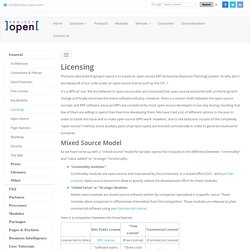
So why don't we release all of our code under an open-source license such as the GPL ? It's a difficult one. We are believers in open-source who are convinced that open-source economics will, on the long term change and finally dominate the entire software industry. However, there is a certain misfit between the open-source concept and ERP software, because ERPs are considered by most open-source developers to be very boring; resulting that few of them are willing to spend their free time developing them.
We have tried a lot of different options in the past in order to tackle this issue and to make open-source ERPs work. Pourquoi est-ce que les licences « pas d'usage commercial » sont une mauvaise idée ? On trouve souvent des contenus numériques gratuitement accessibles, librement utilisables et réutiisables mais avec une règle supplémentaire : pas d'utilisation commerciale autorisée.
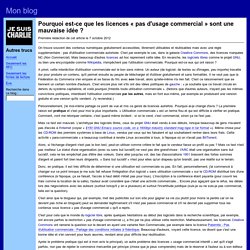
C'est par exemple le cas, dans la galaxie Creative Commons, des licences marquées NC (Non Commercial). Mais beaucoup d'autres licences ad hoc reprennent cette idée. En revanche, les logiciels libres comme le projet GNU, ou bien une encyclopédie comme Wikipédia, n'empêchent pas l'utilisation commerciale. Pourquoi est-ce eux qui ont raison ? Défense et illustration de la clause non-commerciale. Depuis le mois d’avril 2012, la fondation Creative Commons International a annoncé qu’une nouvelle version de ses licences (la 4.0) allait être publiée et un appel à commentaires a été lancé pour inviter la communauté à participer à la réflexion.

Des modifications importantes sont envisagées, comme le fait de globaliser les licences pour ne plus avoir à les adapter pays par pays, en fonction des législations nationales. Mais c’est une autre question qui s’est imposée dans les discussions : celle de la conservation ou non de la clause Non Commercial – Pas d’Utilisation Commerciale (NC). Quentin Metsys. Le Prêteur et sa femme. Domaine public. Il s’agit à vrai dire d’un vieux débat qui divise le monde du libre depuis des années. [ox-en] Copyfarleft: Response to Stefan Meretz. From: Dmytri Kleiner <dk telekommunisten.net>Date: Sun, 6 Jan 2008 22:55:26 +0100 Thank you to Stefan Meretz for taking the time to engage at length with my essay, "Copyfarleft, Copyjustright and the Iron Law of Copyright Earnings.
![[ox-en] Copyfarleft: Response to Stefan Meretz](http://cdn.pearltrees.com/s/pic/th/copyfarleft-response-stefan-114151474)
" The main argument advanced in the essay is that artists can not earn a living from exclusivity of "intellectual property" and that that neither copyleft licenses like the GPL, nor "copyjustright" frameworks such as the creative commons, can help. Between Copyleft and Copyfarleft: Advance reciprocity for the commons. Miguel Said Vieira & Primavera De Filippi Introduction Licensing debates abound in the “free culture” academic discussion (see, i.a., Downes, 2009; Hill, 2005; Lemos, 2010; Netpop Research, 2009; UNESCO OER Community, 2011), but we believe much of it suffers from one of two problems.
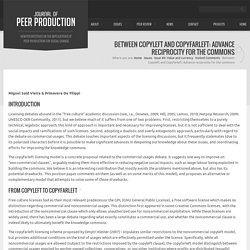
First, restricting themselves to a purely technical, legalistic approach; this kind of approach is important and necessary for improving licenses, but it is not sufficient to deal with the social impacts and ramifications of such licenses. Second, adopting a dualistic and overly antagonistic approach, particularly with regard to the debate on commercial usages. This debate touches important aspects of the licensing discussions, but it frequently stalemates (due to its polarized character) before it is possible to make significant advances in deepening our knowledge about these issues, and coordinating efforts for improving the knowledge commons. Peer Production License. The peer production license is an example of the Copyfarleft type of license, in which only other commoners, cooperatives and nonprofits can share and re-use the material, but not commercial entities intent on making profit through the commons without explicit reciprocity This version of the Peer Production License: a model for Copyfarleft was copied from the text "The Telekommunist Manifesto".
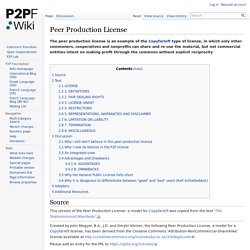
Created by John Magyar, B.A., J.D. and Dmytri Kleiner, the following Peer Production License, a model for a Copyfarleft license, has been derived from the Creative Commons ‘Attribution-NonCommercial-ShareAlike’ license available at Please add an entry for the PPL to a. B. C. D. E. F. G. H. I. Nothing in this License is intended to reduce, limit, or restrict any uses free from copyright or rights arising from limitations or exceptions that are provided for in connection with the copyright protection under copyright law or other applicable laws. d. to Distribute and Publicly Perform Adaptations. A. B.